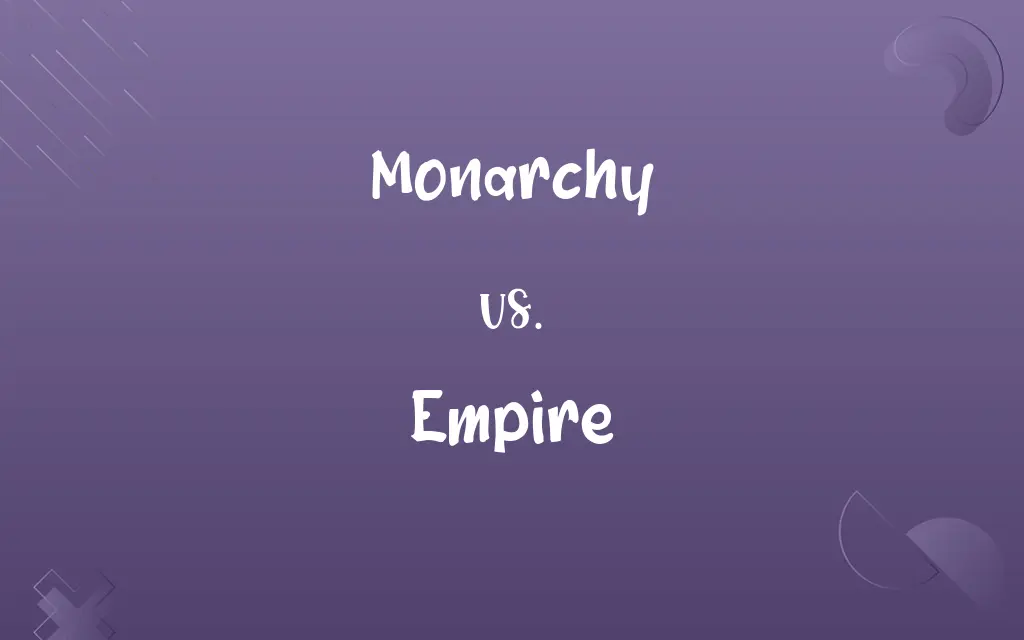Monarchy vs. Empire: Know the Difference

By Shumaila Saeed & Hifza Nasir || Published on May 25, 2024
A monarchy is a form of government with a monarch at the head, while an empire is a large sovereign state or territory often ruled by an emperor and comprising multiple regions or peoples.

Key Differences
Monarchy and empire represent different aspects of governance and territorial control. A monarchy is defined by its form of government, where a single family rules over the country, with leadership typically passed down through generations. The monarch, whether a king, queen, or another title, serves as the head of state, often under a constitutional or absolute framework. In contrast, an empire denotes a vast sovereign territory that extends beyond a single nation, encompassing various regions, peoples, and sometimes nations, under the control of an emperor or empress. While empires are characterized by their expansive control and diverse populations, monarchies focus on the method of governance and lineage of rulers within a single nation or territory.
Hifza Nasir
May 25, 2024
Empires often emerge from the expansion of a nation under a monarchic rule, extending their sovereignty through conquest or union over diverse territories. This expansion leads to a complex blend of cultures, languages, and peoples unified under a single imperial authority. Monarchies, on the other hand, may remain within their national boundaries, emphasizing stability, tradition, and continuity of leadership. While all empires are ruled by a sovereign authority, not all monarchies qualify as empires due to their scale and the diversity of the territories they control.
Hifza Nasir
May 25, 2024
The governance within an empire can vary widely, from centralized authority to a more federated structure allowing for local governance under imperial oversight. Monarchies may adopt various forms of government, from absolute, where the monarch has total control, to constitutional, where their powers are limited by law or a governing body. The distinction also lies in the scope of rule: empires typically have a broader, more ambitious governance agenda, incorporating a multitude of ethnic groups and territories, whereas monarchies often focus on national governance within established boundaries.
Shumaila Saeed
May 25, 2024
Empires have been seen as symbols of power and achievement, representing a nation's ability to conquer and govern vast territories. Monarchies, while also powerful, are more closely associated with the continuity of heritage and the legitimacy of rule through descent. The transition from a monarchy to an empire can signify a nation's rise in power and influence, reflecting its expansion beyond its original borders.
Shumaila Saeed
May 25, 2024
Choosing between a monarchy and an empire as a form of rule or identification depends on the historical context, territorial ambitions, and the method of governance preferred. Both have played significant roles in shaping the political landscapes of their times, with their legacies continuing to influence modern governance and cultural identities.
Hifza Nasir
May 25, 2024
ADVERTISEMENT
Comparison Chart
Definition
A form of government with a monarch at the head, ruling over a country or territory.
A large sovereign state or territory, often ruled by an emperor, comprising multiple regions or peoples.
Shumaila Saeed
May 25, 2024
Key Characteristic
Hereditary leadership and a focus on lineage and tradition.
Expansive territorial control and governance over diverse populations.
Hifza Nasir
May 25, 2024
Governance
Can be absolute or constitutional, with varying degrees of power vested in the monarch.
Varies from centralized to federated systems, with an emphasis on broad territorial administration.
Shumaila Saeed
May 25, 2024
Scale
Generally limited to a single nation or territory.
Encompasses multiple nations or territories, often across continents.
Dua Fatima
May 25, 2024
Historical Significance
Often associated with stability, tradition, and national identity.
Symbolizes power, conquest, and cultural amalgamation.
Hifza Nasir
May 25, 2024
ADVERTISEMENT
Monarchy and Empire Definitions
Monarchy
Focuses on the continuity of leadership through heredity.
In Monaco, the monarchy is central to national identity.
Shumaila Saeed
Feb 28, 2024
Empire
Ruled by an emperor or empress with sovereign authority.
The Russian Empire was governed by an emperor until 1917.
Shumaila Saeed
Feb 28, 2024
Monarchy
Associated with a single nation or territory.
The Kingdom of Sweden is a constitutional monarchy.
Hifza Nasir
Feb 28, 2024
Empire
A vast state composed of different territories under a single ruler.
The Roman Empire encompassed diverse cultures under its rule.
Hifza Nasir
Feb 28, 2024
Monarchy
A governance system led by a single family line.
The United Kingdom is governed as a constitutional monarchy.
Shumaila Saeed
Feb 28, 2024
ADVERTISEMENT
Empire
Characterized by expansion and control over multiple regions.
The British Empire was once the largest in history.
Shumaila Saeed
Feb 28, 2024
Monarchy
Often symbolizes national tradition and heritage.
Japan’s monarchy is the world's oldest continuous hereditary monarchy.
Hifza Nasir
Feb 28, 2024
Empire
Represents power and the ability to govern diverse territories.
The Mongol Empire was the largest contiguous land empire.
Hifza Nasir
Feb 28, 2024
Monarchy
Can vary from absolute control to ceremonial roles.
The monarchy in Saudi Arabia holds significant political power.
Shumaila Saeed
Feb 28, 2024
Empire
Incorporates a variety of peoples and languages.
The Austro-Hungarian Empire was a multi-ethnic, multi-lingual empire.
Dua Fatima
Feb 28, 2024
Monarchy
A government in which sovereignty is embodied within a single, today usually hereditary head of state (whether as a figurehead or as a powerful ruler).
An absolute monarchy is a monarchy where the monarch is legally the ultimate authority in all temporal matters.
A constitutional monarchy is a monarchy in which the monarch's power is legally constrained, ranging from where minor concessions have been made to appease certain factions to where the monarch is a figurehead with all real power in the hands of a legislative body.
Shumaila Saeed
Feb 27, 2024
Empire
A political unit having an extensive territory or comprising a number of territories or nations and ruled by a single supreme authority.
Shumaila Saeed
Feb 27, 2024
Monarchy
A form of government where sovereignty is embodied by a single ruler in a state and his high aristocracy representing their separate divided lands within the state and their low aristocracy representing their separate divided fiefs.
Shumaila Saeed
Feb 27, 2024
Empire
A political unit, typically having an extensive territory or comprising a number of territories or nations (especially one comprising one or more kingdoms) and ruled by a single supreme authority.
The Russian empire
Shumaila Saeed
Feb 27, 2024
Empire
A group of diverse companies under common ownership and run as a single organization.
Shumaila Saeed
Feb 27, 2024
Empire
A political unit ruled by an emperor or empress.
The Empire of Vietnam was a short-lived client state of Japan governing Vietnam between March 11 and August 23, 1945.
Shumaila Saeed
Feb 27, 2024
Monarchy
A state or government in which the supreme power is lodged in the hands of a monarch.
Hifza Nasir
Feb 27, 2024
Repeatedly Asked Queries
Can a monarchy be part of an empire?
Yes, a monarchy can be part of an empire if the empire encompasses the monarch's territory among its diverse regions.
Shumaila Saeed
May 25, 2024
What is an empire?
An empire is a vast sovereign territory comprising multiple regions or peoples under the control of an emperor or empress.
Hifza Nasir
May 25, 2024
How do empires expand their territories?
Empires expand through conquest, colonization, or union, incorporating new regions into their sovereign control.
Shumaila Saeed
May 25, 2024
What defines a monarchy?
A monarchy is a form of government where a monarch (king, queen, or equivalent) rules over a country, with leadership often passed down through generations.
Hifza Nasir
May 25, 2024
Can an empire exist without being a monarchy?
Yes, empires can exist under different forms of governance, including republics, as long as they maintain control over vast territories and diverse populations.
Hifza Nasir
May 25, 2024
What leads to the fall of empires?
Empires can fall due to a variety of factors, including overexpansion, internal conflict, economic issues, or external invasions.
Shumaila Saeed
May 25, 2024
Are all empires ruled by emperors?
While traditionally empires are ruled by emperors, the term can also apply to territories ruled by monarchs with different titles but similar expansive control.
Hifza Nasir
May 25, 2024
What is the difference between an absolute and a constitutional monarchy?
In an absolute monarchy, the monarch has unrestricted power, whereas in a constitutional monarchy, their powers are limited by law or a parliamentary system.
Dua Fatima
May 25, 2024
How do monarchies and empires handle governance over diverse populations?
Monarchies may focus on national governance, while empires often have to manage governance over a more diverse, multi-ethnic population through various administrative structures.
Shumaila Saeed
May 25, 2024
How do modern interpretations of monarchies and empires differ from their historical counterparts?
Modern monarchies often have ceremonial roles with limited political power, while the concept of empire has largely shifted to denote historical states rather than contemporary political entities.
Shumaila Saeed
May 25, 2024
Share this page
Link for your blog / website
HTML
Link to share via messenger
About Author
Written by
Shumaila SaeedShumaila Saeed, an expert content creator with 6 years of experience, specializes in distilling complex topics into easily digestible comparisons, shining a light on the nuances that both inform and educate readers with clarity and accuracy.
Co-written by
Hifza Nasir








































































